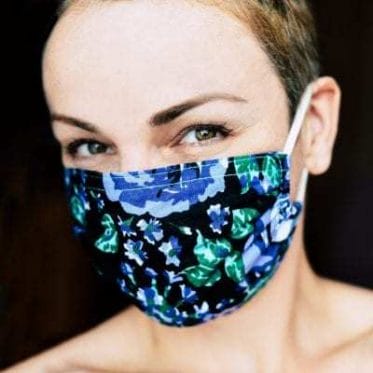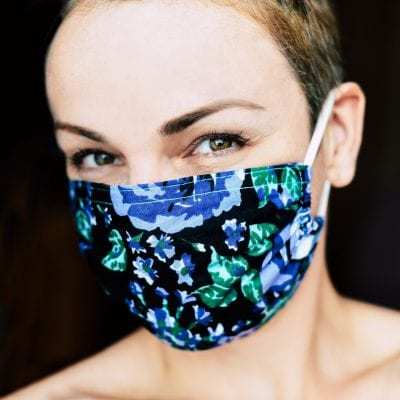Are You Smiling?
The Complex Implications of Face Masks

By Annette Willett
Associate Occupational Therapist at the Purple House Clinic, Loughborough
The extensive new government rules on the wearing of face mask / coverings in many indoor public spaces was written into law on the 8th of August 2020. We are now slowly getting used to seeing masked people everywhere, but this strange new world we now inhabit brings a wealth of new challenges.
Although the rules vary slightly across the UK, face coverings are generally now required in most public indoor settings (excepting children under 11 as well as people with certain conditions for whom mask-wearing is not advisable or could cause significant distress). Such measures have markedly changed our daily lives, and will continue to do so for some time to come.
Regardless of whether they are wearing face coverings themselves, what might this mean for young people and for those with mental health challenges or disabilities?
Children
Whether aged over 11 and required to wear a face covering (or under 11 and not), young people may struggle with the mask-wearing world. Indeed, many of us may have particular empathy for the experiences of infants and young children who will spend many formative months meeting the wider world around them without the benefit of seeing people’s smiles and facial expressions. How will this impact their developing brains? We must hope that the impact is marginal when compared to the non-mask wearing experiences they will encounter at home and in childcare settings.
From an emotional point of view, the idea that there’s something in the air that can harm us, is a difficult concept on its own for the developing child. That it’s possible to cause illness to others further compounds the worries.
Whilst parents worldwide seek to help with their children’s difficulties, they must also try to understand and process the ever-changing news and guidance whilst simultaneously coping with their own fears and anxieties. We don’t yet fully know how mask-wearing and covid in general will impact upon our children’s perception of their own safety within the world, but we have to accept that their worldview may be irreversibly altered to some degree.
However, by their very nature, children and young people do often feel a certain sense of indestructibility. To a large degree this is a biological imperative as (even in the pre-covid world) children have always had to navigate a continual series of new challenges in order to become well-rounded adults. ‘Risking on purpose’ is an essential skill, and parents will need to be balancing those vital opportunities with the covid challenge.
Somebody really needs to write a chapter on covid and put it into that ever growing ‘parents manual’ that we all wish we had to hand when children are in our care! Until then, there are a few key things we can do to support our children:
- Give them age-appropriate information about covid;
- Offer a calm and balanced perspective about risk and mask wearing;
- Pay attention to our children’s emotional experiences;
- Stay curious – sometimes our assumptions about our kids’ feelings can be misguided or plain wrong.
Mental Health
Whilst covid has challenged us all emotionally, it is particularly difficult for those who were already experiencing mental health challenges. Everyone’s psychological experience is different but, for some, key pre-existing vulnerabilities such as social isolation and fears about safety will have been deeply exacerbated.
For these people, this year will have undoubtedly brought about some very dark moments. Even those with seemingly robust mental constitutions will have been tested by covid and lockdown.
Face coverings add a further challenge for people struggling with their mental health. Imagine navigating a masked world when you already struggle to trust those around you and fear what people may say or do. Imagine having cripplingly low self-esteem and issues with body image and being asked to wear a mask. Imagine feeling ‘masked’ already, burdened already with experiences of abuse that you cannot tell – and then add to that an actual mask to make you feel even more hidden and alone.
There’s no doubt that mask-wearing can be distressing to our mental health. Therefore, sensitivity and support for those around us who may be struggling with masks is vital at this time. Furthermore, we must try to remember that people’s mental health difficulties are rarely conspicuous – so let us all think carefully and empathically before we challenge those naked faces.
Disabilities
Masks challenge our ability to ‘read’ others and this may be particularly tricky for those with an Autism Spectrum condition – where they may already struggle to process social communication. Masks also present challenges to individuals with other types of disabilities – such as impairment of vision, speech or hearing. For the deaf community in particular, there are obvious and significant challenges around lip reading.
With this in mind, we need to think about alternative ways that we can communicate intent, meaning and expression. At this time it’s important to pay particular attention to your body language, tone of voice, communicating through the eyes, eyebrows and hands (give a wave to say hello!).
The Duchenne smile is a particular type of smile where the corners of your mouth lift at the same time as your cheeks causing the corners of your eyes to wrinkle. This type of smile signals genuine pleasure and enjoyment – and right now it will be more welcome than ever!
The Duchenne Smile – Smile with Your Eyes!

For all of the potential negative psychological implications of mask-wearing, we should also bear in mind that masks may actually come as a relief to some. Face coverings could potentially provide a useful barrier, allowing some of us to explore our social world a little more confidently.
Learning from Others
I have listened with great interest to the opinions of those around me regarding mask-wearing – and it’s fair to say that there appears to be a bit of ‘Marmite effect’ going on: Some are embracing them whilst others are extremely bothered by them.
A wonderful lady I know draws a picture on her mask at work before she throws it in the bin at the end of each work day (thank you Kerry for sharing these!). A little bit of good humour can go a long way!
Another friend of mine accidentally bumped into a stranger in a shop (inadvertent error on the one-way system). She immediately apologised from under her mask, only to be told, “Well, you don’t look sorry!”. My friend was left wondering if the stranger really meant that comment, or whether she had missed the possible sarcasm as both were wearing masks!
I am sure all of you will have some very personal stories about masks which I would be very interested to hear.

Tips
- Be kind! We are all in this together – and whilst tensions may be high do try and support anyone and everyone.
- Pay special attention to those who may feel more vulnerable due to their age, mental health or physical health disabilities (and remember many problems are not visible).
- For people who can’t wear a mask and fear judgement for not doing so, consider wearing a badge saying ‘face covering exempt’ (some local authorities are providing these).
- Talk to your children – be curious about their feelings and educate them in a calm and balanced way about the risks measures in place.
- Consider how you communicate (even more so now): Be clear, be positively expressive and remember our brain knows we are smiling, even if it’s not apparent due to our masks, so the feel-good endorphins will still be released.
- Have a couple of extra masks tucked away. We’ve all left home and had to go back for our keys, glasses, etc. So let’s try and not add masks to this list!
- Wash masks daily if they are washable and dispose responsibly of non-reusable masks. We don’t want a landfill problem or to find our sea creatures wearing them in a month or two!
- Also think about where you are buying your masks from. This could be an opportunity to support small or minority group businesses that have been disproportionately affected by covid.
- Stick with it. If nothing else, this pandemic will have taught us about the importance of resilience and persistence – skills that we will always need!
Other Articles by Annette Willett:
Why Everyone is Going Bananas for Banana Bread!
Other Covid-related articles:
There’s No Place Like Home: The Secret to Harmonious Relationships During Lockdown



